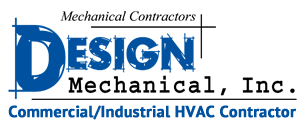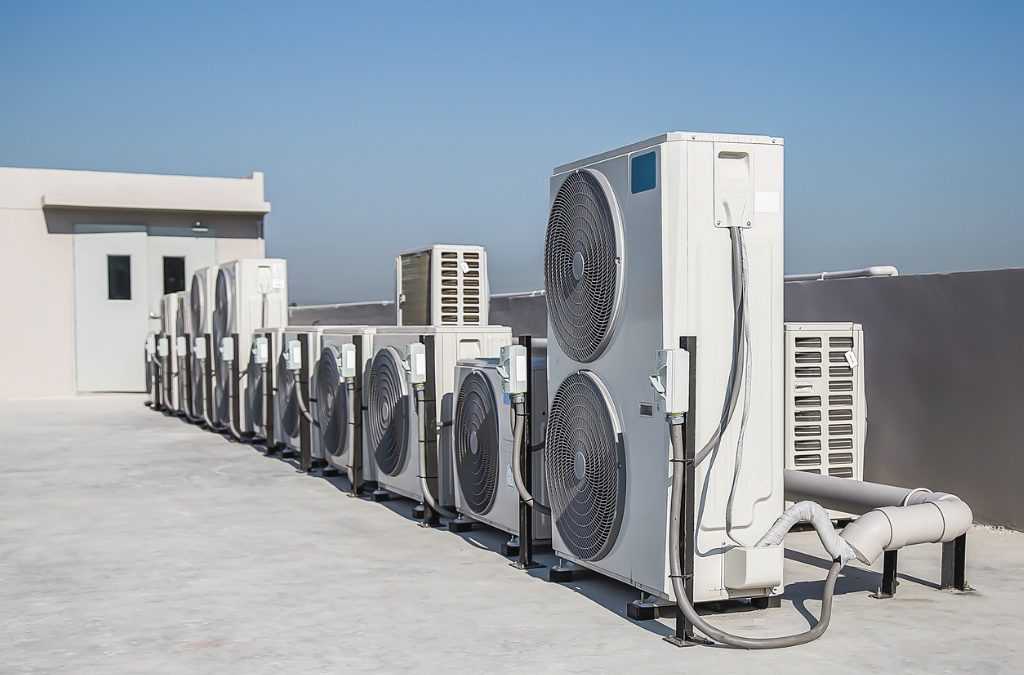Purchasing a new HVAC system for your commercial building is an expensive investment. As a result, it’s crucial to know how to get the most out of it for as long as possible.
As a commercial building or business owner, you know the importance of understanding the life expectancy of your investments to accurately plan and budget your business expenses. Although HVAC technology advancements have extended the life cycle of almost every product in the industry, there is always the possibility that faulty parts and minor issues will reduce your HVAC system’s effectiveness.
In this article, we’ll look at the average lifespan of commercial HVAC equipment and its various components, what key factors influence an HVAC system’s lifespan, and provide you with a few tips for maintaining your commercial HVAC system. Continue reading below to learn more and discover why Design Mechanical is the preferred choice for professional HVAC services in Kansas City.
How Long Should a Commercial HVAC System Last?
While a commercial HVAC unit‘s life expectancy is never guaranteed, an estimated lifespan will give you a good starting point to work from when other factors that influence service life are considered.
However, not all HVAC systems are built the same and use parts from various suppliers, resulting in HVAC units that may have varying life expectancies. As a result, all HVAC units will gradually lose performance over time, resulting in no way to predict how long a system will remain operational.
On average, the typical lifespan of a commercial HVAC system is between 15 and 25 years, depending on the equipment’s proper inspections and routine maintenance. Otherwise, you could be spending your budget on needless repairs, or worse, pay for new equipment prematurely.
Although commercial HVAC components are designed to withstand significant use, with so many moving parts, it can be difficult to precisely determine how long each will last. While the average lifespan of these components will vary depending on various factors listed above, here is a general guideline to follow.
- Air Conditioner 15 years
- Air Compressor 15 years
- Boilers 25 years
- Chillers 20 years
- Condensers 20 years
- Cooling Towers 20 years
- Ductwork 30 years
- Furnace 20 years
- Heat Exchanger 15 years
- Heat Pump 15 years
- Radiant Heaters (Electric) 10 years
- Radiant Heaters (Hot Water or Steam) 25 years
- Roof Tank 15 years
What Factors Affect the Lifespan of a Commercial HVAC System?
A commercial HVAC system is a complex machine made up of a network of numerous heating, cooling, and ventilation components. As a result, the system’s installation, preventative maintenance, and usage over time play a significant role in how long the unit lasts and how well it performs.
Although they share some fundamental similarities with residential HVAC systems, commercial HVAC systems are far more sophisticated. However, all major appliances become less effective as they age, increasing energy expenses and maintenance.
When determining the life expectancy of your commercial HVAC system, here are some of the various factors to keep in mind:
Quality of Installation
Professional installation services are required for a commercial HVAC system to function as it was designed. Poor HVAC installation can make the unit prone to various breakdowns such as air and water leaks and inefficient air distribution, resulting in premature system failure. As a result, be sure that a licensed and qualified commercial heating and cooling professional completes your commercial HVAC installation.
Operating Conditions
The usage of an HVAC system in a commercial building is influenced by various factors such as building size, occupancy, business operations, production activities, climate conditions, and more.
Heating and cooling systems that are used sparingly or are controlled by a building automation system likely will not sustain as much wear and tear as a system that is left to run 24 hours a day, seven days a week. Be sure to consider how the unit is being used over time, as this will influence the lifespan of a commercial HVAC unit and energy expenses.
Maintenance Schedule
Proper maintenance of your commercial HVAC system is essential for any building owner that wants their system to last as long as possible. Poor maintenance causes components to fail sooner than expected, reduces the system’s energy efficiency, and places the unit under unnecessary stress.
Typical manufacturer’s recommendations regarding HVAC inspections and maintenance are quarterly. This provides the healthiest scenario for your HVAC equipment. If your building’s commercial HVAC system has been neglected or is starting to show signs of failure, contact a licensed HVAC professional today.
Type of HVAC Unit
Some HVAC systems are designed to last longer than others. When an HVAC unit is undersized or oversized, its lifespan is reduced due to the unit being overworked, resulting in more wear and tear damage than a properly sized unit for the facility. Always work with a commercial HVAC installation professional to ensure you choose the right HVAC system for your commercial space.
Tips for Maintaining Your Commercial HVAC System
Maintaining year-round comfort entails much more than simply installing the best HVAC system. Business owners and facility managers must also take preventative maintenance measures to extend the life of their HVAC systems.
An efficient, well-running HVAC system ensures that the building maintains a comfortable, cool temperature inside and prevents mold and mildew from forming but also saves you time and money on costly repairs in the future. Here are some maintenance tips you can actively implement to extend the life of your HVAC unit to ensure your heating and cooling system operates at peak efficiency for years to come:
Change the Filters Regularly
Clean air is vital, especially in commercial buildings, and clean air filters allow your HVAC system to run more efficiently. Air filters also prevent dust, bacteria, debris, and other contaminants from entering your building and should be replaced every three months.
How long has it been since you changed the filters in your HVAC unit? If your environment is particularly dusty, consider replacing your air filters once a month or consult with an HVAC technician to determine how frequently you should change your air filters based on the mechanics of your building.
Inspect the Condenser
The condenser is the unit of your HVAC system that is typically located outside of your building. Due to its location, it’s vulnerable to various elements from severe weather conditions, which can result in damage or obstructed airflow.
Inspect it regularly and clear away debris or vegetation planted too close to the unit. Additionally, keep an eye on the landscaping and look for proper drainage, rust, or other visible damage.
Avoid Overworking the Unit
Setting unrealistic thermostat levels is an easy way to overwork your HVAC system. Not only will it result in increased monthly utility bills, but it can also cause components within your HVAC unit to wear down more quickly.
Your HVAC unit’s fan will most likely have an “auto” setting that turns on the unit’s fan when the system starts actively heating or cooling the building. To save money and prevent significant component damage, consider using the automatic setting as much as possible.
Schedule Regular Maintenance
Some building managers only contact an HVAC technician when their system fails. However, the failure has already caused significant disruption by then, and the cost to get the system back up and running can be expensive.
Rather than waiting until disaster strikes, recommend having your HVAC unit serviced by an experienced technician regularly. During a maintenance visit, your technician will thoroughly clean your air conditioning and heating systems to remove accumulated dust and debris. They’ll also lubricate all moving parts and tighten electrical connections, which reduces the effects of normal wear and tear.
Contact Design Mechanical Today for Expert Commercial HVAC Services
As previously stated, each component in your HVAC unit has its own lifespan and maintenance requirements. If one part fails, it can significantly impact all aspects of your heating and cooling system. Fortunately, a preventative maintenance plan for your commercial HVAC system is one of the best ways to protect your HVAC system and extend its lifespan.
If you suspect that your commercial HVAC system is showing signs of failure, contact the commercial heating and cooling experts at Design Mechanical today.
Design Mechanical has provided expert commercial HVAC services to the Kansas City area and surrounding communities. With over 100 certified HVAC service specialists on call 24 hours a day, seven days a week, 365 days a year, you can be confident that our comprehensive commercial HVAC services will ensure that your HVAC system is always performing as expected.
If your commercial HVAC system isn’t functioning correctly, contact Design Mechanical today to schedule a free consultation with one of our HVAC experts and discover why we are the number one choice for 24/7 HVAC maintenance services in Kansas City.

